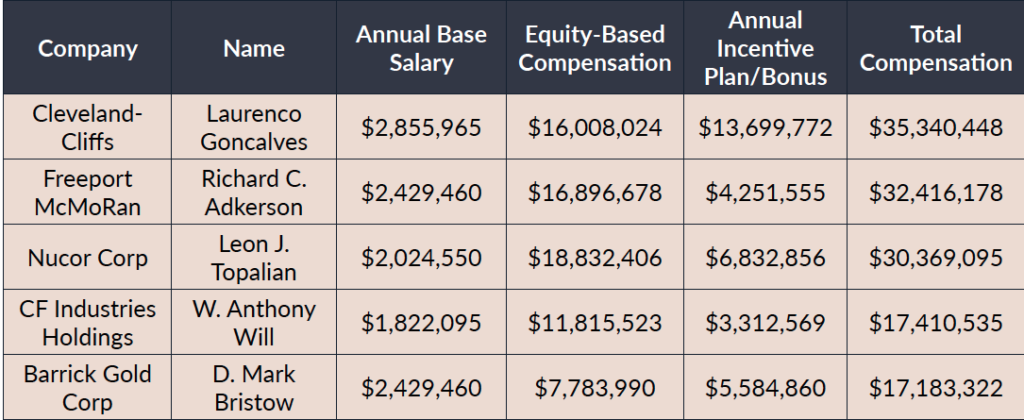Chief executive base salaries in the mining industry increased between 2% and 12% in 2023, according to the Bedford Group/TRANSEARCH’s 2024 Board and Executive Compensation Report.
Companies with assets under US$100 million reported median CEO salaries of US$251,988. Those with assets over US$20 billion paid a median of US$1,900,978. Despite these gains, gender diversity remains stagnant at the top. Just 5.2% of CEOs identified as female, a modest rise from 4.1% in 2022 and 3.7% in 2021.
“Base salaries are rising as companies compete for skilled leaders who can navigate financial volatility,” Bedford managing partner Frank Galati said in a release on Tuesday.
Last year, Laurenco Goncalves, CEO of Cleveland-Cliffs (NYSE: CLF), earned the highest pay at US$35.34 million. His package included an annual base salary of US$2.9 million, equity-based compensation of US$16 million and a bonus of US$13.7 million.
Richard Adkerson of Freeport-McMoRan (NYSE: FCX) earned US$32.4 million. It included a US$2.4 million salary, US$16.9 million in equity awards, and US$4.3 million in bonuses.
Leon Topalian of Nucor (NYSE: NUE) ranked third, receiving US$30.4 million. His earnings included a base salary of US$2 million, equity compensation of US$18.8 million, and a US$6.8 million bonus.

Door revolving faster
CEO turnover also increased, with 15.1% of companies replacing their top bosses in 2023, up from 14.4% in 2022. This trend reflects ongoing challenges in retaining top leaders, Galati said.
The report blames higher base salaries on retention pressures. Companies in the mid-tier asset bracket—those with US$1 billion to US$20 billion in assets—saw a 22% to 24% rise in median total CEO compensation.
The report analyzed data from 277 mining companies on the TSX, ASX, Nasdaq, and NYSE. It covered over 1,100 named executives and 1,700 board members. Median total CEO pay, including salary, bonuses, and equity, was US$341,000 for companies with under US$100 million in assets. It was US$9 million for firms with over US$20 billion in assets.
But total compensation declined in five of the seven asset tiers. The ranges span from companies with assets under US$100 million (first tier) to those with assets over US$20 billion (seventh tier). CEOs at companies with assets under US$1 billion saw their median pay fall by up to 11%. This was due to smaller equity grants amid tight market conditions.
Gender gap
While base salaries rose across the board, the gender imbalance in mining leadership remains stark. Female CEOs lead only 5.2% of companies, and women account for just 13.5% of named executive roles the report assessed, down from 14.7% in 2022.
Female board representation reached 24.6% last year, a slight improvement from 21.8% the year before. Progress is further constrained by a lack of female board chairs, with just 9.2% of these positions held by women.
“The slow progress in gender diversity signals the industry must take bolder steps to promote inclusion at the highest levels,” Galati said.
Equity grants
The report also highlights shifting market dynamics. Smaller companies struggled with declining equity-based compensation due to reduced investor interest in exploration and development projects. By contrast, larger firms leveraged performance-based incentives, aligning pay with shareholder returns. For companies with assets exceeding US$20 billion, bonuses and equity awards made up nearly 70% of total CEO compensation.
The report urges mining companies to adopt fair pay-for-performance systems. It also calls for action to lower barriers to gender diversity.



